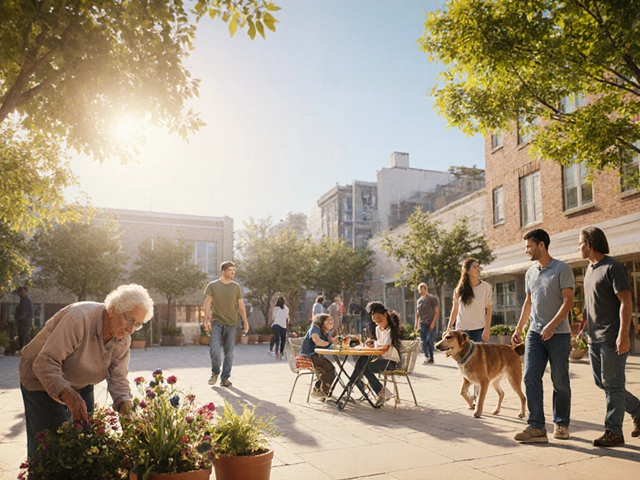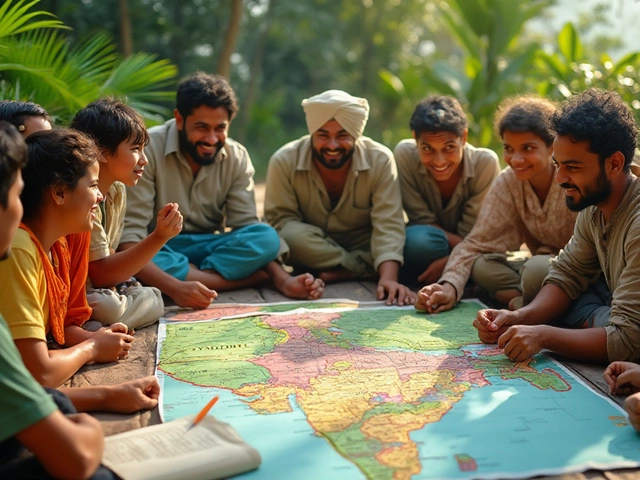If life feels heavy or seems like you’re carrying it solo, you’re far from alone. Millions of folks turn to support groups every year, hoping to find a place where understanding isn’t just possible—it’s expected. Whether you’re facing grief, addiction, parenting struggles, chronic illness, depression, or maybe just feeling lost, that shared nod across a circle can be a game changer. Turns out, sharing space with people working through similar struggles is more than comforting—it’s down-to-earth, science-backed self-care.
Why Support Groups Matter More Than You Think
Maybe you’re skeptical. Do those circles of folding chairs and earnest faces actually help? Put simply—yes. Research from organizations like the American Psychological Association finds that people who join support groups cope better than those who go it alone. In a 2024 clinical study from Stanford, participants who met weekly with a peer group reported a 27% higher improvement in managing stress than those using solo therapy. There’s something about being among others who get the struggle first-hand. Lonely? You walk in and realize, "Wow, not just me." That simple recognition boosts hope, which—believe it or not—helps lower cortisol, the body’s stress hormone.
Support groups aren’t just for mental health, either. Cancer support networks, addiction recovery meetings, parenting groups, grief circles, and resources for chronic pain or PTSD—these spaces show up for every struggle. Even organizations like the National Alliance on Mental Illness (NAMI), Alcoholics Anonymous, or Parents Helping Parents keep growing because real people keep showing up for one another. Some groups meet in-person with weekly sessions, while others connect online or mix things up. Different models, but the goal’s always the same: connection, understanding, and practical support. Here’s a quick look at the numbers behind support groups and how widespread they really are:
| Group Type | # Groups in US (2025) | Average Weekly Attendance |
|---|---|---|
| Mental Health Support | 22,000+ | 12-18 |
| Addiction Recovery | 35,000+ | 7-25 |
| Grief/Loss | 8,500+ | 10-16 |
| Parenting | 6,000+ | 8-20 |
| Illness/Chronic Pain | 11,200+ | 6-15 |
So, whether you’re after understanding, accountability, friendship, or all three, real stats prove that support groups bring it by the bucketful. But how do you actually find a group that fits your story?
Places to Start Your Search for Local Support Groups
The internet’s a blessing and a curse when you’re searching for help. Type "support group near me" into a search bar, and you’ll get a firehose of results. But not every listing is active or legit. Your best bet is to start by asking the folks or organizations you trust. Here are some tried-and-true real-world moves to help you find a genuine local support group:
- Ask Your Healthcare Provider: Believe it or not, your primary care doc or therapist usually knows which groups work and which, well, don’t. Hospitals and clinics often keep listings right at the front desk or on digital bulletin boards.
- Public Libraries: Most branches keep up-to-date directories of community meetings, including support groups by topic—everything from divorce and bereavement to ADHD parents’ circles.
- Community Centers: Neighborhood rec centers often host meetings after hours. Check their bulletin boards, or ask the receptionist. Sometimes you’ll even spot flyers for brand-new groups looking for members.
- Faith Groups and Churches: If you’re open to spiritual spaces, churches, temples, and mosques regularly organize grief circles, AA meetings, and other community support events (no membership required!).
- City or County Websites: Municipalities post directories for residents, often marked as "community resources" or "family services." These lists are updated far more often than shady online directories.
You can also reach out to local chapters of major organizations. For example, NAMI offers in-person and online meetings across the country, and AA or NA have searchable tools to find the next meeting near you. If you’re dealing with a specific challenge like cancer, diabetes, or autism, just about every advocacy group has regional listings (and contact info for group facilitators who love helping newcomers).
Oh, and one last tip—don’t forget social media. Facebook Groups or community pages on Nextdoor or Reddit often host area-specific chats about support groups that never make it into the search engines. You’ll get honest takes from people who’ve actually sat in the chairs, not just glossy marketing, and that’s priceless.

Evaluating a Group: What Makes a Good Support Group?
So you’ve found a few options. Next question: How do you know if a group will be a healthy place for you? Not every support group “fits”—and that’s not your fault. Healthy groups have a few things in common, and spotting the difference early can save you time and frustration. Here’s how to check it out before you go, or after a meeting or two:
- Facilitator Training: The best groups have a trained facilitator, sometimes a peer or a mental health pro, who keeps conversations safe, respectful, and confidential. If no one’s in charge or the rules feel fuzzy, that’s a red flag.
- Clear Purpose: Each group should have a clear focus—grief, substance use recovery, parenting twins, whatever. You want a group where everyone’s there for something similar, so the support is real and specific.
- Ground Rules: In solid groups, you’ll hear things like "confidentiality is a must," or “let’s avoid giving each other direct advice.” These boundaries help everyone feel safe enough to actually share.
- Inclusive Atmosphere: No one wants to feel judged or put down. The best groups welcome new members, avoid cliques, and don’t pressure you to spill your heart if you’re not ready. Everyone’s story has space.
- Consistency: Good groups show up reliably—weekly, bi-weekly, at a set location or link. If meetings are canceled last-minute or group size swings like a yo-yo, consider checking out another meeting nearby.
- No Fees or Low Cost: Most reputable support groups run on donations. If someone demands a hefty sign-up fee, be wary—it could be more business than support.
If you’re nervous before your first meeting, that’s expected. Most people are! You’re not signing a contract. Go once, listen, say hello if you feel like it. And afterwards, ask yourself: Did you feel respected, heard, or a hint more optimistic than when you walked in? That’s how you know you’re in the right place.
And pro tip—don’t give up after one awkward experience. Groups have different personalities, and sometimes it takes a few tries to find your real fit. There’s zero shame in searching until you land in a room where you feel like you can actually breathe. That’s where the healing starts.
Tools, Apps, and Online Options for Support
Sometimes getting to a physical group isn't possible. Busy workdays, caring for kids, health flare-ups—whatever the reason, there’s no need to skip support just because you’re stuck at home. Luckily, the world of online support groups is not just a trend—it’s exploded since 2020, and it keeps breaking barriers. About a third of all support groups across North America now offer a virtual hook-up option, with dedicated apps springing up just for this purpose.
Here's what you can try if you're internet-savvy, or just want support in your pajamas:
- Meetup: This trusty website isn’t just for hiking clubs. Type in "support group" plus your city or zip, and you’ll spot everything from depression support to parent meetups, both in-person and virtual.
- 7 Cups: This site connects people needing a listening ear with trained volunteer listeners and peer support groups, 24/7, totally anonymous and free.
- Support Group Central: An online platform with live video support meetings for mental health, addiction recovery, and more. Sort by topic and time zone.
- Reddit: Subs like r/depression, r/griefsupport, or r/stopdrinking host active text-based peer groups. The anonymity makes it easier for many to open up.
- Facebook Groups: Search for your concern plus "support group," filtered by location for local events, or join bigger groups for instant support from worldwide members.
Most major advocacy orgs—like NAMI, the American Cancer Society, or The Compassionate Friends—offer their own virtual groups or can direct you to regional ones. Virtual meetings might seem strange at first, but a lot of people find it’s even easier to open up on a screen. Plus, no travel, no worries about bumping into your boss at a meeting. Here’s a handy table of common platforms, what they offer, and what you’ll need to join:
| Platform | Main Focus | Cost | Best Feature |
|---|---|---|---|
| Meetup | All Topics | Free/Low Cost | Local and online group discovery |
| 7 Cups | Mental Health | Free | Instant confidential chatting |
| Support Group Central | Mental/Physical Health | Free/Donation | Small live video groups |
| Facebook Groups | All Topics | Free | Large, active communities |
Before you jump into any online group, a tip from regulars: always check the group rules and privacy settings. Some spaces are truly private, while others may be open and visible to anyone. If anonymity is your top priority, stick with platforms that guarantee it or use a nickname. And of course, steer clear if anyone asks for personal info or money upfront—reliable support groups never do that.
At the end of the day, support is about connection—not perfection. Taking that first step, whether you walk into a church basement or log into a Zoom room, counts. Nobody can promise every group will be "the one," but stashing away pride and asking for help is one of the bravest moves you’ll ever make. Keep at it—because on the other side of awkward introductions and a few stale cookies, real support is waiting. That’s a fact worth remembering.





